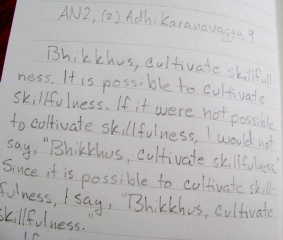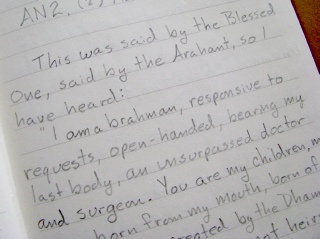The Blessed One Is Talking to You: Making Your Personal Anthology

When we read the suttas faithfully, we are going to find passages that strongly resonate with us. We may get a feeling that the Buddha is speaking to us directly, seeing our defilements and giving the precise antidote to our disease of suffering. It is meant for us personally. Although these passages are beneficial to us the moment we encounter them, they will be most useful when our defilements are strongest. However, when our defilements are strong we may not be able to find them quickly. The solution is to create a personal anthology.
A personal anthology is not simply a collection of important suttas. It is your own personal medicine cabinet for your particular disease of suffering. By collecting the suttas that you consider best address your strongest defilements, and having them in one handy location, you will be able to easily find the Dhamma medicine when you need it the most.
For example, you may be strongly prone to anger. One day you may read the following verse from the Saṁyutta Nikaya:
The killing of anger, O devatā,
SN 1:71
With its poisoned root and honeyed tip:
This is the killing the noble ones praise.
You may immediately feel this describes your experience of anger. Anger sometimes has a certain sweetness, doesn’t it? But at its root it is highly poisonous. When you encounter the passage, you may relate it to anger that you have experienced in the past. By including this passage in your personal anthology, when you become angry you can quickly consult it when you need it most. Eventually you may be able to instantly recall the complete passage, but until then your personal anthology will have your cure.
How to create a personal anthology

Find a small blank book. It does not need to be very large. A pocket sized book is easy to keep with you when you travel. Use this book solely to record the suttas.
Only copy the text of the sutta. Do not add your own comments or reflections. You may have powerful insights from the text—which is good—but you need not record these here. If your insights are authentic, you do not need to record them. When we go to these texts in a time of trouble, we want to consult the direct words of the Blessed One without our own interpretation or reflections. Allow the Buddha to speak directly to you each time. If you really want to keep track of your thoughts, consider creating a study notebook.
It is not necessary to copy an entire sutta. You can write down the passages that conveys the essence of the teaching. At the same time, remember that the teachings are always contextual and thus recording some of the background narrative may be helpful. When a repetitive analysis is given for a list of items, such as the five aggregates, you may want to abbreviate it in the way commonly done in published editions. Alternatively, if you find the passage especially helpful you may want to recreate all the repetitions in full so you can use it directly as an aid to contemplation.

Always include the citation of the sutta, whether you include the entire text or just an excerpt. This will allow you to find the original easily whenever you need to. You may even want to note the name of the translator. This is helpful when sharing the merit of the benefit you receive from reading the text.
What kind of suttas to collect
There are several types of relationships you may have with a text. There are some passages where you will have a clear and almost uncanny sense that the Supreme Buddha is giving this teaching to you personally. One of the marvels of the Buddha is that he was able to present the teaching in different ways for different people based on their temperament and social background. Although the Buddha is not physically present with us now, we have an excellent record of these thousands of teachings. While we are reading we must keep in mind this personal nature of the suttas.
One of the main reasons these suttas feel so personal to us is that they act as an antidote to our defilements. Although the roots of our defilements are the same, they may manifest in different ways for each of us. This is why some suttas may resonate strongly with one person but not with another. It is not important to figure out why. It is enough to recognize what suttas really act as a medicine for our own ailment of suffering. Also bear in mind that every single teaching of the Supreme Buddha conveys Dhamma that will liberate some people from suffering. When we recognize this, we will not select suttas for recording with a critical view of those that are less relevant to us in our present conditions.
There are some suttas that we may simply find uplifting regardless of their immediate relevance to our inner struggles. For example, a particular simile may give you clear insight into a subject and leave your mind feeling calm and cool. These are suttas that you will surely want to collect in your anthology.
How to use your personal anthology

Use your personal anthology when you feel distressed. Use it to see more clearly your defilements, which may appear in diverse forms. Think first of the five hindrances. When you are overcome by greed. When you are overcome by ill will. When you are feeling tired and lazy. When you are agitated. And, especially, when you have doubts about the teachings. The Buddha did not tell us to simply put up with these mental states. He wanted us to overcome them, and he gave us specific tools to deal with them. Once you compile a collection of texts, you will be able to take this Dhamma medicine. If you cannot stir up energy on your own, read the Buddha’s words. Reading something so true and clear will wake you up to reality.
By habitually going to the Blessed One’s instructions in times of difficulty, you will develop confidence in the Dhamma, and the suttas will become an integral part of your life.
- Step One: Read the Buddha’s discourses.
- Step Two: Add the ones you find most helpful to your anthology.
- Step Three: Use these suttas as aids when defilements arise.
Related Articles:
- Not read to copy things out? Try making an Almost Personal Anthology
- How To: Writing in a Small Book
- Should you take notes during sutta practice?
- Troubleshooting your Personal Anthology
- How To: Sutta Practice Basics
